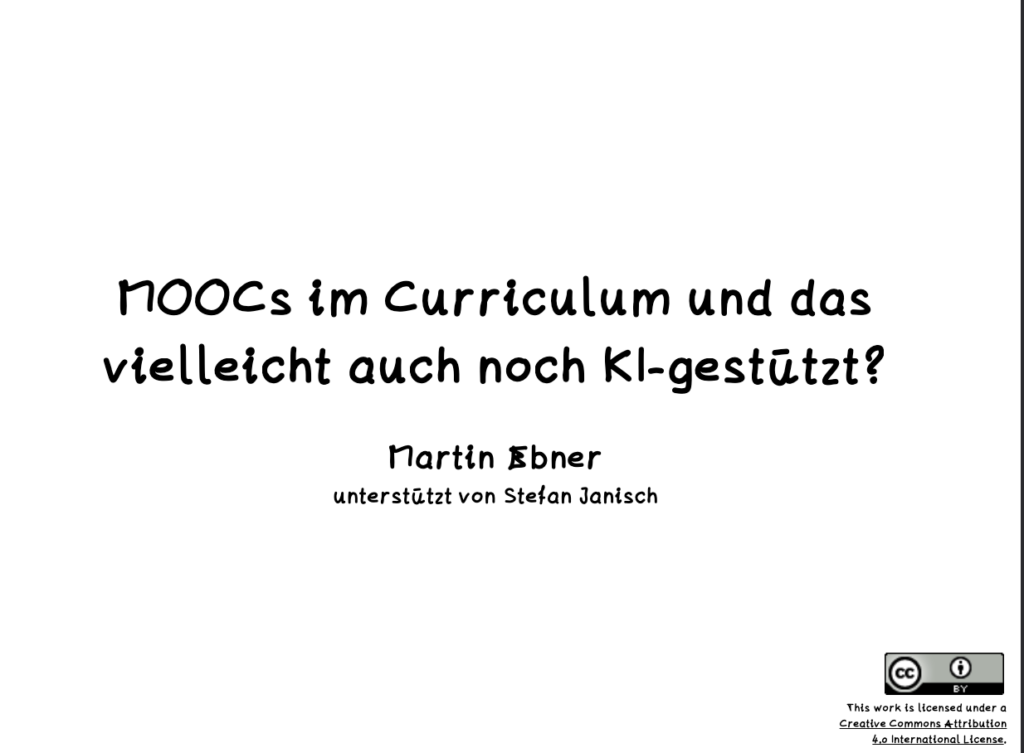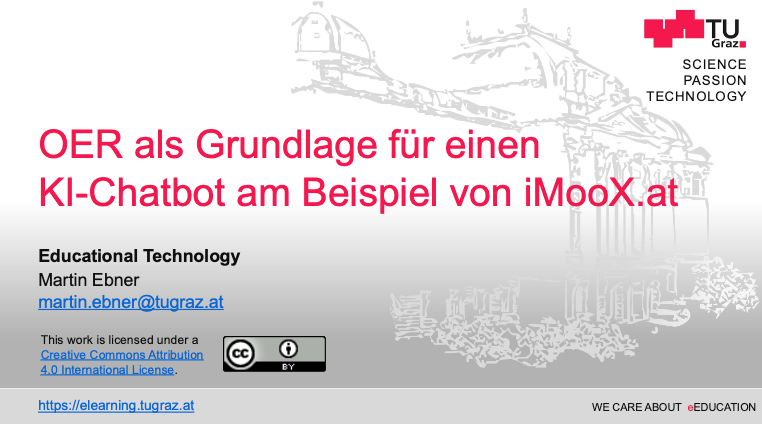Im Rahmen der Veranstaltung „Curricula entwickeln mit KI und anderen Tools“ von e-Teaching.org durfte ich einen Workshop zu „MOOCs im Curriculum und das vielleicht auch noch KI-gestützt?“ gestalten. Hier gibt es noch meine Folien nachgereicht:


Digitale Lehre an und rund um der Technischen Universität Graz
Im Rahmen der Veranstaltung „Curricula entwickeln mit KI und anderen Tools“ von e-Teaching.org durfte ich einen Workshop zu „MOOCs im Curriculum und das vielleicht auch noch KI-gestützt?“ gestalten. Hier gibt es noch meine Folien nachgereicht:

Our publication about „Exploring genAI Chatbots in MOOCs: Analyzing Student Interactions and Self-Regulated Learning Behaviors“ got published.
Abstract:
The integration of generative AI (genAI) chatbots into Massive Open Online Courses (MOOCs) presents new opportunities for supporting self-regulated learning (SRL). This study examines 1,302 chat-bot interactions from two Austrian blended MOOCs, where a retrieval-augmented generation (RAG) chatbot based on GPT 4o-mini was deployed to assist students. Using the process-action framework by Lai (2024), we categorize chatbot interactions into key SRL processes: defining , seeking, engaging, and reflecting. Results show that students predominantly use the chatbot for information retrieval, content summarization, and quiz-based reinforcement, with 41% of interactions classified as information search queries and 17% as rehearsal. However, engagement with metacognitive SRL strategies, such as goal setting and self-evaluation, remains low. Additionally, non-learning interactions, including humor-driven conversations, functional queries, and prompt injection attempts, showcase ways students interact with AI in educational settings. Based on our findings, we propose refinements to the existing SRL process-action framework, incorporating new categories to better account for genAI chatbot-specific interactions, such as Evaluation of Information Quality and Reformatting. We discuss implications for chat-bot integration in MOOCs, emphasizing AI-generated quizzes, structured feedback, and safeguards against misuse.
[article @ book’s homepage]
[draft @ ResearchGate]
Rerence: Brünner, B., Ebner, M., Schön, S. (2025). Exploring GenAI Chatbots in MOOCs: Analyzing Student Interactions and Self-regulated Learning Behaviors. In: Hamonic, E., Sharrock, R. (eds) Digital Education: Shaping Sustainable Lifelong Learning for All in the Era of AI. EMOOCS 2025. Lecture Notes in Computer Science, vol 15733. Springer, Cham. https://doi.org/10.1007/978-3-032-00056-9_2
This is an impactful contributions, methodological rigor, and exceptional novelty in the research field of AI in education using a Chatbot within a MOOC-platform (iMooX.at)
Im Rahmen der Veranstaltung „Online-Fachtagung: OER im Zeitalter von KI“ veranstaltet vom Multimedia Kontor Hamburg durfte ich Einblicke geben in den OER-Chatbot, welchen wir auf iMooX.at eingebettet haben:

Fast schon traditionell, darf ich den Start des MOOC „Informatik-FIT“ verkünden, welcher vor allem unseren Studienanfänger:innen helfen soll, den Einstieg in die Informatik zu erleichtern:
Die Vielfalt der Probleme, die in der Informatik behandelt werden, macht eine kurze und dennoch vollständige Definition dessen, was Informatik ist, unmöglich.
Unmöglich ist es auch, alle Themen in einem Einführungskurs unterzubringen.
Irgendwo müssen wir aber trotzdem anfangen und so haben wir versucht, die wichtigsten Grundbegriffe und Ideen der Informatik auszuwählen und diese so zu vermitteln, dass sich die Teilnehmer:innen schnell ein breiteres Bild von der Informatik machen können.
Darüber hinaus soll es für die Teilnehmer:innen möglich sein, Zusammenhänge zwischen den einzelnen Themen zu erkennen bzw. herzustellen.
Der Trailer zum MOOC:
Die Teilnahme ist natürlich wie immer kostenfrei: [Link zur Anmeldung zum MOOC]
Hinweis: Letztes Jahr hatten wir erstmals einen KI-basierten Chatbot im Einsatz, heuer darf ich verraten ist es eine Videochatbot. Wir sind gespannt wie gut dieser das Lernen unterstützen kann.
This is an impactful contributions, methodological rigor, and exceptional novelty in the research field of AI in education.
Our publication titled „InfoFit and Beyond: AI Chatbots as EdTech Tools for Self-Regulated Learning in MOOCs“ at this year’s HCII conference is available.
Abstract:
Massive Open Online Courses (MOOCs) have become essential for the democratization of education by providing accessible learning opportunities to broad audiences. However, their asynchronous and open structure is challenging for learning, especially in terms of maintaining engagement, and self-regulated learning (SRL) is necessary. This study investigates the integration of a retrieval-augmented-generation (RAG) chatbot into a MOOC and uses generative AI (genAI) to enhance learn-ers‘ SRL processes. The chatbot is based on Zimmermann’s SRL framework and is prepared for the MOOC content, basics of computer science. It is designed to support learners in the forethought, performance, and self-reflection phases by providing concise, context-specific responses. A mixed-method evaluation with 79 participants revealed high levels of satisfaction , with over 98% of respondents recommending the chatbot for future courses. The chatbot proved effective in supporting tasks such as summarization and concept clarification; however, its role in maintaining motivation emerged as a key area for further investigation. These findings underscore the transformative potential of AI chatbots in asynchronous learning environments, while also highlighting the importance of incorporating multimodal and motivational features to maximize educational technology (EdTech) impact.
[full article @ publisher’s homepage]
[draft @ ResearchGate]
Reference: Brünner, B., Ebner, M. (2025). InfoFit and Beyond: AI Chatbots as EdTech Tools for Self-Regulated Learning in MOOCs. In: Smith, B.K., Borge, M. (eds) Learning and Collaboration Technologies. HCII 2025. Lecture Notes in Computer Science, vol 15807. Springer, Cham. https://doi.org/10.1007/978-3-031-93567-1_4
Benedikt presented our research work at 27th International Conference on Human-Computer Interaction, Gothenburg, Sweden.

Brünner, B., & Ebner, M. (2025, Juni 23). Presentation: InfoFit and Beyond: AI Chatbots as EdTech Tools for Self-Regulated Learning in MOOCs. Graz University of Technology. https://doi.org/10.3217/4hn9k-bz211
Our contribution to this year’s SITE conference in Orlando titled „Chatbots in Education: A Systematic Rapid Literature Review“ is published.
Abstract:
This review explores the role of chatbots in education through a detailed literature review of 60 records. As chatbots become increasingly embedded in students‘ daily lives, their presence in primary, secondary, and tertiary education is expanding rapidly. By analyzing the selected papers, this review highlights both the opportunities and challenges faced by educators and students when using chatbots. The findings indicate that the integration of AI in education offers significant potential but requires careful consideration. In particular, the study emphasizes the need for improved teacher and student training, updated policies, and effective assessments to maintain academic integrity and enhance learning outcomes.
Reference: Gregorac, A., Brünner, B. & Ebner, M. (2025). Chatbots in Education: A Systematic Rapid Literature Review. In Proceedings of SITE 2025 (pp. 588-593). Waynesville, NC USA: Association for the Advancement of Computing in Education (AACE). Retrieved March 24, 2025 from https://www.learntechlib.org/primary/p/225579/.
Benedikt und ich haben eine kurze Zusammenfassung über die derzeit laufenden Forschungsarbeiten für das fnma magazin verfasst mit dem Titel „Selbstlernphasen mit KI Chatbots – kann das gelingen?„
Zusammenfassung:
Unsere Hochschule ist ein Ort der Vielfalt und Heterogenität. Bezüglich der Diversität beim Vorwissen unserer Studienanfänger:innen spielen Individualisierung und gezielte Förderung eine wichtige Rolle. In diesem Beitrag geben wir Einblick in die Implementierung eines generativen KI (genKI) Chatbots für Studienanfänger:innen im Fachbereich Informatik an der TU Graz.
[Artikel @ ResearchGate]
[fnma magazin 01/2025]
Referenz: Brünner, B., Ebner, M. (2025) Selbstlernphasen mit KI Chatbots – kann das gelingen? fnma magazin 01/2025. S. 11-13. https://www.fnma.at/content/download/3179/20735?version=3
Heute startet ein weiterer Brückenkurs der TU Graz – „Informatik-Fit (2024/25)„. Damit wollen wir unsere zukünftigen Studierenden unterstützen, sich auch in diesem Fachbereich ein wenig einzuarbeiten:
Die Vielfalt der Probleme, die in der Informatik behandelt werden, macht eine kurze und dennoch vollständige Definition dessen, was Informatik ist, unmöglich.
Unmöglich ist es auch, alle Themen in einem Einführungskurs unterzubringen.
Irgendwo müssen wir aber trotzdem anfangen und so haben wir versucht, die wichtigsten Grundbegriffe und Ideen der Informatik auszuwählen und diese so zu vermitteln, dass sich die Teilnehmer:innen schnell ein breiteres Bild von der Informatik machen können.
Darüber hinaus soll es für die Teilnehmer:innen möglich sein, Zusammenhänge zwischen den einzelnen Themen zu erkennen bzw. herzustellen.
Hier gibt es den Trailer zum MOOC:
Die Anmeldung ist natürlich frei und der Kurs kostenlos: [Link zur Anmeldung]
Hinweis: Es wird bei diesem MOOC erstmals ein Chatbot zum Einsatz kommen – nachdem die ganze Welt über Künstliche Intelligenz redet, wollen wir uns auch bei iMooX dem Thema widmen und praktisch erproben, wie ein solcher Bot beim Lernen helfen kann. Viel Spaß beim Testen bzw. Lernen 🙂
Our publication „Mobile Gramabot: Development of a Chatbot App for Interactive German Grammar Learning“ got published in the International Journal of Emerging Technologien in Learning.
Abstract:
This study aims to develop the Gramabot application as a means of online learning during the pandemic and to examine its effectiveness as a medium for German grammar learning. The design-based research uses learning experience design methodology. Beside an introduction of the state of the art of chatbots for language learning, the paper describes the concept of the chatbot application and its evaluation. Prior experiences with chatbots, implementation experiences and evaluations insights were obtained from 36 Indonesian students with beginner level German language skills. The data were described using qualitative and simple descriptive statistical analysis. The results of the analysis show that most of the respondents are familiar with several chatbot applications, the use of chatbots is not as a learning medium, but as a means of asking questions about products. In addition, String Matching is a suitable method used to develop Gramabot. Based on the results of the evaluation, it can be concluded that Gramabot can help students understand basic level grammatical material.
[article @ journal’s homepage]
[article @ ResearchGate]
Reference: Kharis, M., Schön, S., Hidayat, E., Ardiansyah , R. ., & Ebner, M. (2022). Mobile Gramabot: Development of a Chatbot App for Interactive German Grammar Learning . International Journal of Emerging Technologies in Learning (iJET), 17(14), pp. 52–63. https://doi.org/10.3991/ijet.v17i14.31323